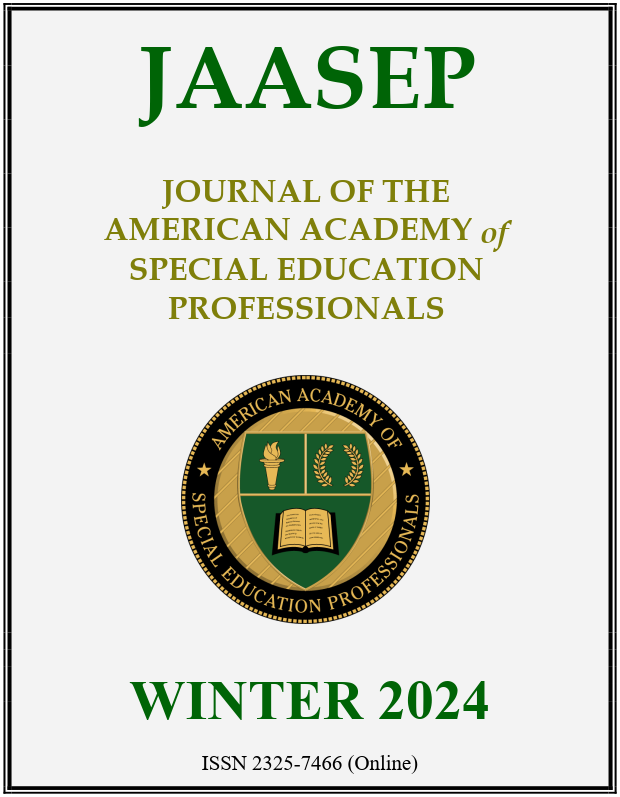When Parents of Children with Severe Autism Become Their Teachers: Unique Cases from the COVID-19 Pandemic
Addison, J. T. (1992). Urie Bronfenbrenner. Human Ecology, 20(2), 16-20
Alhuzimi, T. (2021). Stress and emotional wellbeing of parents due to change in routine for children with Autism Spectrum Disorder (ASD) at home during COVID-19 pandemic in Saudi Arabia. Research in Developmental Disabilities, 108, https://doi.org/10.1016/j.ridd.2020.103822 DOI: https://doi.org/10.1016/j.ridd.2020.103822
Asbury, K., Fox, L., Deniz, E., Code, A., & Toseeb, U. (2021). How is COVID-19 affecting the mental health of children with special educational needs and disabilities and their families? Journal of Autism and Developmental Disorders, 51(5), 1772-1780. DOI: https://doi.org/10.1007/s10803-020-04577-2
Azoulay, U. (2020, November 11). Global Education Coalition. UNESCO. https://en.unesco.org/covid19/educationresponse/globalcoalition
Baxter, P., & Jack, S. (2008). Qualitative case study methodology: Study design and implementation for novice researchers. The Qualitative Report, 13(4), 544-559. https://doi.org/10.46743/2160-3715/2008.1573 DOI: https://doi.org/10.46743/2160-3715/2008.1573
Boyd, B. A. (2002). Examining the relationship between stress and lack of social support in mothers of children with autism. Focus on Autism and Other Developmental Disabilities, 17(4), 208-215.https://doi.org/abs/10.1177/10883576020170040301 DOI: https://doi.org/10.1177/10883576020170040301
Braun, V., & Clarke, V. (2006). Using thematic analysis in psychology. Qualitative Research in Psychology, 3(2), 77-101. DOI: https://doi.org/10.1191/1478088706qp063oa
Braun, V., & Clarke, V. (2012). Thematic Analysis. In H. Cooper, P. M. Camic, D. L. Long, A. T. Panter, D. Rindskopf, & K. J. Sher (Eds.), APA handbook of research methods in psychology, Vol. 2. Research designs: Quantitative, qualitative, neuropsychological, and biological (pp. 57–71). American Psychological Association. https://doi.org/10.1037/13620-009 DOI: https://doi.org/10.1037/13620-009
Bronfenbrenner, U. (1986). Ecology of the family as a context for human development: Research perspectives. Developmental Psychology, 22(6): 723–742. DOI: https://doi.org/10.1037//0012-1649.22.6.723
Cahapay, M. B. (2020). How Filipino parents home educate their children with autism during COVID-19 period. International Journal of Developmental Disabilities, 1-4. DOI: https://doi.org/10.1080/20473869.2020.1780554
Coyne, L. W., Gould, E. R., Grimaldi, M., Wilson, K. G., Baffuto, G., & Biglan, A. (2020). First things first: Parent psychological flexibility and self-compassion during COVID-19. Behavior Analysis in Practice, 14(4), 1092-1098 DOI: https://doi.org/10.1007/s40617-020-00435-w
Demeulenaere, P. (2012). Theoretical propositions and the interpretation of field research. L’Année sociologique, 62, 67-91. https://doi.org/10.3917/anso.121.0067 DOI: https://doi.org/10.3917/anso.121.0067
Eshraghi, A. A., Li, C., Alessandri, M., Messinger, D. S., Eshraghi, R. S., Mittal, R., & Armstrong, F. D. (2020). COVID-19: Overcoming the challenges faced by individuals with autism and their families. The Lancet Psychiatry, 7(6), 481–483. DOI: https://doi.org/10.1016/S2215-0366(20)30197-8
Ersoy, K., Altin, B., Sarikaya, B., & Ozkardas, O. (2020). The comparison of impact of health anxiety on dispositional hope and psychological well-being of mothers who have children diagnosed with autism and mothers who have normal children, in COVID-19 pandemic. Social Sciences Research Journal, 9(2), 117-126.
Fontanesi, L., Marchetti, D., Mazza, C., Di Giandomenico, S., Roma, P., & Verrocchio, M. C. (2020). The effect of the COVID-19 lockdown on parents: A call to adopt urgent measures. Psychological Trauma: Theory, Research, Practice, and Policy, 12(S1), S79. DOI: https://doi.org/10.1037/tra0000672
Garbe, A., Ogurlu, U., Logan, N., & Cook, P. (2020). Parents’ experiences with remote education during COVID-19 school closures. American Journal of Qualitative Research, 4(3), 45-65. https://doi.org/10.29333/ajqr/8471 DOI: https://doi.org/10.29333/ajqr/8469
Garbarino, J. (1977). The human ecology of child maltreatment: A conceptual model for research Journal of Marriage and the Family, 39, 721-727 DOI: https://doi.org/10.2307/350477
Hurwitz, S., Garman-McClaine, B., & Carlock, K. (2021). Special education for students with autism during the COVID-19 pandemic:“Each day brings new challenges”. Autism, https://doi.org/10.1177/13623613211035935 DOI: https://doi.org/10.1177/13623613211035935
Llewellyn, A. & Hogan, K. (2000). The use and abuse of models of disability. Disability and Society, 15(1), 157 – 165. DOI: https://doi.org/10.1080/09687590025829
McConnell, D., & Savage, A. (2015). Stress and resilience among families caring for children with intellectual disability: Expanding the research agenda. Current Developmental Disorders Reports, 2(2), 100–109. https://doi.org/10.1007/s40474-015-0040-z. DOI: https://doi.org/10.1007/s40474-015-0040-z
McStay, R. L., Trembath, D., & Dissanayake, C. (2014). Stress and family quality of life in parents of children with autism spectrum disorder: parent gender and the double ABCX model. Journal of Autism and Developmental Disorders, 44(12), 3101–3118. https://doi.org/10.1007/s10803-014-2178-7. DOI: https://doi.org/10.1007/s10803-014-2178-7
Manning, J., Billian, J., Matson, J., Allen, C., & Soares, N. (2021). Perceptions of families of individuals with autism spectrum disorder during the COVID-19 crisis. Journal of Autism and Developmental Disorders, 51(8), 2920-2928. DOI: https://doi.org/10.1007/s10803-020-04760-5
Kong, M. (2021) What COVID-19 means for non-neurotypical children and their families. Pediatric Research, 89, 396–397. https://doi.org/10.1038/s41390-020-0913-7 DOI: https://doi.org/10.1038/s41390-020-0913-7
Saliverou, M., Georgiadi, M., Tomprou, D.M., Loizidou-Ieridou, N., & Plexousakis, S. (2021). The impact of COVID-19 pandemic containment measures on families and children with moderate and high functioning ASD (Autism Spectrum Disorder). Education Sciences, 11(12), 783. https://doi.org/10.3390/educsci11120783 DOI: https://doi.org/10.3390/educsci11120783
Smile, S. C. (2020). Supporting children with autism spectrum disorder in the face of the COVID-19 pandemic. CMAJ, 192(21), E587-E587. DOI: https://doi.org/10.1503/cmaj.75399
Toseeb, U., Asbury, K., Code, A., Fox, L., & Deniz, E. (2020). Supporting families with children with special educational needs and disabilities during COVID-19. PsyArXiv Preprints. https://doi.org/10.31234/osf.io/tm69k DOI: https://doi.org/10.31234/osf.io/tm69k
Wheatley, A. (2021) Perceptions of special education services delivered through online learning environments during COVID-19 [Unpublished master thesis]. Brigham Young University Yin, R. K. (2013). Case study research: Design and methods. Sage Publication.
Zviedrite, N., Hodis, J.D., Jahan, F., Gao, H., & Uzicanin, A. (2021). COVID-19-associated school closures and related efforts to sustain education and subsidized meal programs, United States, February 18–June 30, 2020. PLoS ONE 16(9). https://doi.org/10.1371/journal.pone.0248925 DOI: https://doi.org/10.1371/journal.pone.0248925
Downloads
Article Information
- Article Type Articles
- Submitted December 31, 2023
- Published February 15, 2024
- Issue Winter 2024
- Section Articles
